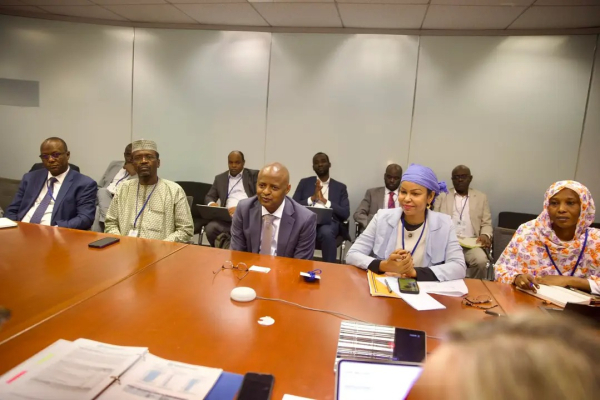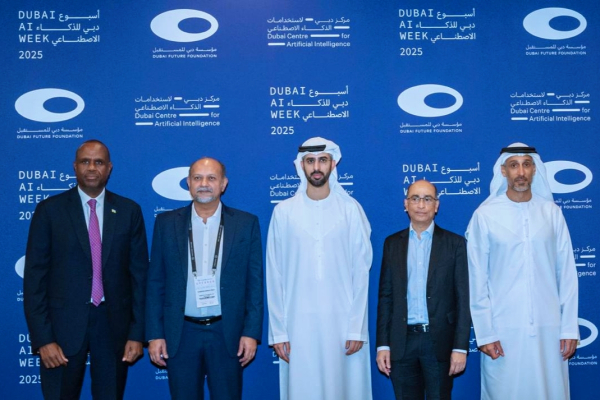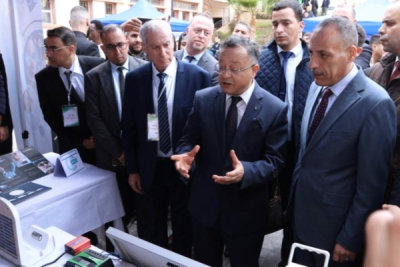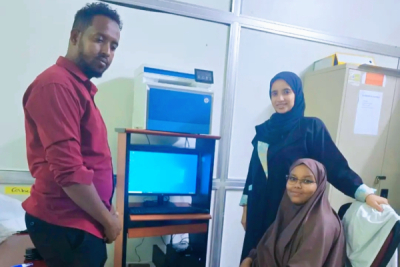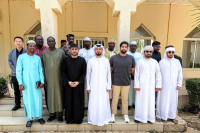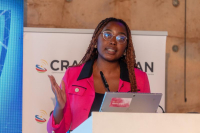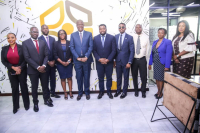
Tech (1151)
- State Minister Nguilin met World Bank officials in Washington on April 24
- Discussions focused on overhauling public services, e-learning, and civil registry digitization
- World Bank signaled readiness to expand support beyond e-procurement to full-service digital platforms
Chad is accelerating its digital transformation efforts and is counting on enhanced support from the World Bank to modernize its public services. On the sidelines of the Spring Meetings in Washington, State Minister Tahir Hamid Nguilin met on Thursday, April 24, with Michel Rogy, the World Bank’s Regional Director for Digital Development, and Jana Kunicova, Sector Director for West and Central Africa, to discuss the way forward.
During the meeting, the Chadian official stressed the urgent need to overhaul financial administrations, improve connectivity, and leverage digital technologies to make government services more accessible, efficient, and transparent. The government has identified key priorities, including the digitization of civil registry records, the digital transformation of school curricula, the expansion of e-learning, and the promotion of local innovation.
These goals are part of the Digital Transformation Support Project, already funded by the World Bank. Launched six months ago, the project has reached a disbursement rate of 8%, which the institution has welcomed as a promising sign. The World Bank reiterated its willingness to go beyond e-procurement support by helping establish an integrated digital platform for public services.
Still, accelerating progress will require substantial technical assistance. Chad faces several hurdles: patchy internet connectivity, a shortage of digital skills, and fragile infrastructure. Enhanced backing from the World Bank could help foster a structured, inclusive, and sustainable digital ecosystem—one designed to improve access to public services and strengthen governance.
According to the ICT Development Index 2024 published by the International Telecommunication Union, only 12.2% of Chadians currently have internet access. The country faces a stark digital divide between urban and rural areas. Additionally, Chad scores just 0.1194 out of 1 on the digital infrastructure development index—one of the lowest ratings globally. Against this backdrop, the World Bank’s support could play a critical role in building a coherent and resilient digital ecosystem that serves citizens and enhances effective governance.
By Samira Njoya,
Editing by Sèna D. B. de Sodji
- Rwanda signed a trilateral memorandum of understanding with C4IR UAE and C4IR Malaysia during Dubai AI Week 2025.
- The partnership focuses on ethical, inclusive, and sustainable approaches to AI development.
- Key areas include governance frameworks, skills development, and technological innovation.
On Wednesday, April 23, during Dubai AI Week 2025, Rwanda inked a three-way memorandum of understanding with the Centres for the Fourth Industrial Revolution (C4IR) of the United Arab Emirates and Malaysia. Ambassador John Mirenge, representing the Rwandan government, finalized the agreement, signaling a significant stride in international collaboration on artificial intelligence.
This partnership aims to build on the momentum generated by Rwanda's AI fellowship program and foster deeper collaboration among the three nations. It will support joint efforts in areas such as governance frameworks, skills development, and technological innovation, with a focus on ethical, inclusive, and sustainable methodologies.
The agreement comes after Kigali hosted the inaugural Global Summit on Artificial Intelligence in Africa. That event, which convened experts, government officials, and private sector partners, underscored Rwanda's aspirations in AI and its increasing prominence in global discussions concerning technology governance.
Since 2022, Rwanda has operated its own Centre for the Fourth Industrial Revolution, established in partnership with the World Economic Forum. This center spearheads AI projects and develops appropriate regulatory structures. An ambitious initiative to create 50 artificial intelligence applications over four years was launched this month, aiming to accelerate the digital transformation of key sectors including healthcare, education, agriculture, finance, and public administration. This program aligns with the national digital development strategy and the country's Vision 2050.
This closer relationship could also enable Rwanda to leverage the advanced experience of the United Arab Emirates, which has already integrated AI into numerous government services, and Malaysia’s expertise in applying technological innovation to industry. For Kigali, this represents a strategic opportunity to expedite the growth of its own artificial intelligence ecosystem while solidifying its standing on the global technology stage.
By Samira Njoya,
Editing by Sèna D. B. de Sodji
- Morocco announced an international call for tenders to digitize the national civil registry.
- The digitization effort covers more than 38 million records across 1,821 civil registry offices.
- Phase one involves converting ~27 million paper documents (some dating to 1915) via manual entry and verification.
- Phase two targets ~11 million already-digitized records for auditing, indexing, and securing.
Morocco is launching an international call for tenders to select service providers for a national civil registry digitization project, the Directorate General of Local Authorities announced. The initiative, with a budget exceeding 194 million dirhams, or roughly $20.8 million, aims to overhaul the management of civil registry records and bolster the digitization of public services nationwide. Bids will be opened on May 29 at the Ministry of the Interior in Rabat.
"This project aims to establish a centralized and secure database, connecting all civil registry offices to a unified, high-performance information system," the Interior Ministry stated. "This will enable real-time data exchange with other public institutions, accelerating procedures, improving service quality, and strengthening the digital transformation of Moroccan administration."
The digitization effort will encompass over 38 million records spread across 1,821 civil registry offices throughout the country. It will proceed in two phases. The initial phase involves approximately 27 million paper documents, some dating back to 1915. These documents will undergo meticulous digitization, manual data entry, and rigorous verification to ensure data accuracy. The second phase will cover more than 11 million already-digitized documents, which will be audited, indexed, and secured to guarantee their integrity and traceability.
Selected service providers will be required to adhere to stringent cybersecurity standards and ensure the faithful preservation of the original documents. Payment for services will be phased, allowing for close monitoring of contractual obligations.
The project also includes the development of an integrated information system designed to centralize data while ensuring its seamless connection with other public services. This system will streamline administrative processes, reduce processing times, and ensure consistent service quality across the country.
Furthermore, an electronic portal will be created for citizens, enabling them to conduct various procedures remotely, including requests for birth certificates, family record books, and the registration of births and deaths. This portal is intended to enhance digital inclusion while alleviating pressure on physical administrative counters.
This project aligns with Morocco's national "Digital Morocco 2030" strategy, spearheaded by the Ministry of Digital Transition and Administrative Reform. Through this initiative, the Kingdom seeks to solidify its ambition to become a leading regional player in the digital sphere, leveraging technological innovation to serve its citizens and modernize public administration. The country has already made strides in this direction, digitizing 600 public services, including 300 for citizens, 200 for businesses, and 100 for government agencies.
By Samira Njoya,
Editing by Sèna D. B. de Sodji
The reform represents a significant stride towards achieving equitable, accessible, and quality healthcare for all Kenyans, leveraging digital innovations to overcome longstanding challenges in the health sector.
On April 22, Cabinet Secretary for Health Aden Duale held a consultative meeting with the National Assembly Committee on Delegated Legislation, chaired by Hon. Samuel Chepkonga (MP, Ainabkoi), at Bunge Towers, Nairobi. The session focused on reviewing the Digital Health (Health Information Management Procedures) Regulations, 2025, ensuring they align with earlier parliamentary recommendations and effectively support the rollout of Universal Health Coverage (UHC).
During the meeting, CS Duale announced the operationalization of USSD code *147#, now in use to help Kenyans transition from the National Health Insurance Fund (NHIF) to the Social Health Authority (SHA)—a major milestone in Kenya’s ongoing healthcare reforms. The discussions also emphasized the need for robust public awareness campaigns, particularly at the grassroots level, to increase understanding and uptake of SHA services.
Kenya’s journey toward UHC has been a long-standing national priority. The NHIF, established in 1966, served as the country’s primary public health insurer for more than five decades. However, persistent challenges, such as limited coverage among informal sector workers and operational inefficiencies, prompted comprehensive reforms. These efforts culminated in the creation of the SHA in 2023, designed to provide more inclusive and sustainable health financing.
To further support this transformation, Kenya enacted the Digital Health Act in October 2023, laying the legal foundation for the safe and effective use of technology in healthcare. The Act enhances data privacy and security while establishing standards for digital health services such as telemedicine and mobile health platforms.
Through the revision of digital health regulations and the integration of user-friendly access channels like the USSD platform, Kenya is building a more accessible, affordable, and efficient healthcare system—one that is digitally empowered and truly inclusive.
Hikmatu Bilali
- Algeria inaugurates rapid prototyping platform at Ouzera University
- The platform supports students with innovative projects, aligning with the national strategy to build a knowledge economy
- It features advanced tools including 3D printing, laser cutting, and modeling equipment
Algeria's Minister of Higher Education and Scientific Research, Kamel Baddari (photo, center), inaugurated a rapid prototyping platform at the University of Ouzera in Médéa province on Tuesday, April 22, aiming to empower students with innovative projects. The facility aligns with the national strategy to position universities as key drivers of the knowledge economy.
"The launch of this technological rapid prototyping platform enhances the outcomes of scientific research, provides students with an avenue to establish startups, and reinforces the strategic role of students in wealth generation and the advancement of the knowledge and innovation economy," Minister Baddari said during the inauguration ceremony.
Equipped with sophisticated modeling tools, laser cutting, and 3D printing capabilities, the platform expedites the design and production of functional prototypes. This offers project developers the chance to realize their concepts more swiftly while lowering manufacturing expenses. It bolsters a growing technological ecosystem within Algerian universities, following the recent introduction of a national cloud computing platform, a drone design and control system, and a university incubator focused on entrepreneurship and innovation.
This initiative is part of a broader push to support the entrepreneurial landscape in Algeria. In recent years, the government has expanded support mechanisms for young project holders through the establishment of support structures such as the National Agency for the Promotion of Incubators (ANPI), startup development centers across various regions, and funding mechanisms like the Algerian Startup Fund, which has been allocated several billion dinars.
Currently, Algeria has several hundred officially registered startups operating in crucial sectors including digital technology, fintech, healthcare, and smart agriculture. The development of technological platforms within universities, such as the one in Ouzera, further strengthens an environment conducive to the emergence of a generation of innovators capable of actively contributing to the country's economic diversification.
By Samira Njoya,
Editing by Sèna D. B. de Sodji
- The Central Procurement Office for Medicines (CAMME) finalized the national installation of mSupply software across all healthcare facilities.
- The system enhances drug stock management, traceability, and supply planning, aiming to reduce stockouts and medication losses.
Djibouti's Central Procurement Office for Medicines and Essential Supplies (CAMME) announced Monday, April 21, the completion of the mSupply software installation across all healthcare facilities nationwide. This milestone represents a significant advancement in the digitization of Djibouti’s health system, an initiative that began in 2022 with technical and financial support from partners, most notably the World Bank.
"Thanks to our management system, stock levels, drug traceability, and supply planning are now optimized, thereby strengthening the efficiency, transparency, and responsiveness of the national pharmaceutical system," CAMME stated.
This modernization effort addresses several key strategic challenges, including preventing stockouts, minimizing losses from expired medications, ensuring the efficient distribution of essential medicines, and securing the tracking of health product flows from the central procurement office to healthcare facilities.
The mSupply software, already utilized in approximately 30 countries globally, has demonstrated its effectiveness, particularly in resource-constrained environments. Its implementation in Djibouti is a component of the 2023–2027 National Pharmaceutical Policy rollout. This policy aims to sustainably improve access to essential medicines while guaranteeing their quality, traceability, and availability. The initiative is part of the broader Health System Strengthening Project, financed by the World Bank and underway since February 2023, with the overarching goal of ensuring improved healthcare access for the entire population.
As numerous African nations increasingly adopt digitization to modernize their healthcare systems, Djibouti is underscoring its ambition to leverage technology as a strategic tool for enhancing health system efficiency and ensuring the continuous availability of essential medicines.
By Samira Njoya,
Editing by Sèna D. B. de Sodji
-
Chad is advancing plans to deploy a smart video surveillance system in its capital, N’Djamena, amid rising crime rates.
-
The system would use high-definition cameras with night vision and behavioral analysis software, connected via a fiber-optic network.
-
Authorities hope the system will help counter organized crime and terrorism, especially near key government sites.
Chad’s capital is moving closer to adopting a high-tech video surveillance system as authorities seek to address growing urban crime. On Thursday, officials from the Ministry of Public Security and Immigration met with international experts to discuss the deployment of an intelligent monitoring network tailored to N’Djamena’s security challenges.
The proposed system would rely on next-generation cameras featuring high-definition sensors, infrared night vision, and behavioral analysis software to detect unusual movements. These devices would be interconnected via a fiber-optic network, supported by reinforced poles, technical cabinets, backup power supplies, and redundant data storage to ensure uninterrupted operation.
The push for modernization follows a surge in criminal activity in N’Djamena since early 2025. If implemented, the system could enhance law enforcement’s ability to counter organized crime and terrorism while improving security around government buildings.
However, the project’s success hinges on key factors: a stable high-speed internet connection, public support, and safeguards to prevent potential overreach and privacy violations.
Chad is not alone in turning to smart surveillance. Neighboring Cameroon has already installed over 3,000 cameras under its Smart City initiative, with plans to expand to 5,000 nationwide. Similar projects in Nigeria, Kenya, and Morocco have also strengthened urban security in recent years.
Should Chad move forward, N’Djamena could join a growing list of African cities leveraging technology to combat crime—balancing safety with civil liberties in an era of digital policing.
By Samira Njoya,
Editing by Sèna D. B. de Sodji
Morocco has been actively digitizing its documentary heritage in recent years. This project is expected to gain significant momentum in the coming months, with the aim of preserving national archives and improving access for everyone.
Morocco's Ministry of Digital Transition and Administrative Reform, the Ministry of Economy and Finance, the Ministry of Youth, Culture and Communication, and the National Library of Morocco signed a partnership agreement on Wednesday, aiming to digitize the library's extensive documentary collection. The agreement was finalized on the sidelines of the third edition of the Gitex Africa technology fair held in Marrakech.
The agreement outlines the digitization of ancient manuscripts, periodicals, and donated collections housed within the National Library. The institution currently holds a significant documentary heritage, encompassing approximately 700,000 books and artworks, along with over 100,000 manuscripts. The partnership also includes an overhaul of the library's institutional portal, the implementation of legal deposit for digital publications, and the integration of the Amazigh language into the digital services offered. Furthermore, a specialized software program for individuals with special needs will be developed.
This initiative is a key component of Morocco's Digital 2030 strategy, which seeks to accelerate the country's digital transformation, notably through the modernization of public services. As the custodian of the nation's written heritage and a center of cultural influence, the National Library plays a pivotal role in this strategy. The project also aligns with the vision of King Mohammed VI, who champions the use of digital technology as a catalyst for human development, knowledge dissemination, and social inclusion. It complements ongoing digitization efforts within the administration, justice system, education sector, and healthcare.
Beyond its technical aspects, the project pursues several objectives: to ensure the long-term preservation of the kingdom’s literary and historical works, safeguarding them against deterioration or loss; to expand access to documentary resources for all citizens, including those in remote regions; and to equip researchers with modern consultation tools. Additionally, the project aims to enhance the international visibility of Morocco’s cultural heritage by making its documentary treasures accessible online, fostering knowledge sharing and transmission on a global scale.
Samira Njoya
As cyber threats become increasingly sophisticated, the establishment of NAM-CSIRT ensures that Namibia is better equipped to detect, analyze, and respond to cyber incidents promptly.
The Communications Regulatory Authority of Namibia (CRAN) launched, on April 14, the Namibia Cyber Security Incident Response Team (NAM-CSIRT) to strengthen the nation's digital security. Funded by a N$20 million seed investment from the Ministry of Information and Communication Technology (MICT), this initiative underscores the government's commitment to safeguarding critical digital infrastructure.
Minister of Information and Communication Technology, Emma Theofelus, emphasized that the allocated funds will equip NAM-CSIRT with essential tools, technology, and personnel to effectively and efficiently address cyber threats. This strategic investment is designed to enhance the team's capacity to respond to and mitigate cyber incidents, thereby reinforcing Namibia's cybersecurity posture.
NAM-CSIRT is established to serve as the nation's central authority for managing cyber threats and incidents. Its primary objective is to enhance the security and stability of Namibia's critical infrastructure and information systems across government institutions, agencies, and other key sectors.
As of December 31, 2024, Namibia recorded over 1.2 million cyber events and more than 2.7 million cyber vulnerabilities, with seven major incidents managed during that period, according to NAM-CSIRT. Notably, in December 2024, Telecom Namibia suffered a significant cyberattack, resulting in the exfiltration of approximately 626.3GB of data by the attackers who later leaked some portions of sensitive data on social media.
NAM-CSIRT is expected to serve as Namibia's frontline defense against cyber threats, ensuring swift and effective responses to cyber incidents. The team will operate under a governance framework that upholds the highest standards of integrity and accountability.
Hikmatu Bilali
Zambia, like many African countries, faces the challenge of brain drain, with skilled tech professionals leaving for better opportunities abroad. The survey will address this by informing policies that could retain local talent, foster better job opportunities, and create an environment conducive to innovation.
Zambia has launched the State of the Developer Ecosystem in Zambia Survey 2025, a collaborative effort between the ICT Association of Zambia (ICTAZ) and BongoHive, a technology and innovation hub. The survey, announced on April 11, aims to guide Zambia’s digital transformation, with insights on the needs, challenges, and goals of the developer community.
At the launch, Minister of Technology and Science, Hon. Felix Mutati, commended BongoHive and ICTAZ for their foresight and leadership in launching the state of the developer Ecosystem in Zambia Survey 2025.
The survey will address several key areas. First, it will focus on skills development, ensuring that developers have continuous access to learning and training in emerging fields like AI, blockchain, and cybersecurity. It will also tackle employment and opportunities to retain talent and reverse brain drain through targeted policies. Entrepreneurship and innovation will be prioritized, with a focus on providing tech start-ups with capital, mentorship, and supportive policies. The survey will also examine overcoming barriers, emphasizing the importance of improving innovation quality to attract funding and support. Lastly, it will explore the strategic pillars of skills development and entrepreneurship to further boost digital growth.
According to the Ministry of Technology and Science, the ICT sector grew 17.8% in 2024, contributing 3.5% to GDP. This growth demonstrates that digital technology is increasingly becoming a key driver of economic progress. By focusing on the developer ecosystem, the government aims to sustain this momentum and ensure the sector is equipped to meet future challenges. As technology continues to disrupt industries, from agriculture to finance, the demand for skilled developers is more critical than ever to fuel the digital economy.
Hikmatu Bilali
More...
- Mauritius plans mandatory registration for online vendors to improve e-commerce regulation
- Proposed registry will require sellers to obtain licenses and meet compliance standards
- Initiative aims to curb digital scams and improve consumer protection through seller traceability
Online vendors in Mauritius will soon face mandatory registration under initial proposals discussed between Commerce Minister Michaël Sik Yuen and consumer groups. The measure aims to tighten e-commerce regulations and combat the increasing number of digital scams by ensuring seller traceability and enhanced consumer protection.
The project envisions creating an official registry of online sellers operating in Mauritius. Each online merchant will be required to obtain a license to operate legally and comply with a defined set of standards. These requirements are intended to provide clearer oversight of the sector and help differentiate legitimate sellers from illegal operators.
Highlighting the need for such regulation, Jayen Chellum, Secretary-General of the Consumers’ Association of Mauritius (ACIM), said: "It only takes someone posting a product [on social media, Editor’s note], requesting payment through a bank account or mobile app, and the customer never receives the order. We’ve seen cases both locally and internationally."
Local media outlets quoted the minister as saying that the first draft of the registry is expected in the coming weeks. Authorities plan to implement an inclusive, flexible, and gradual process to ensure the system's success and prevent segments of the digital economy from reverting to informality.
By Adoni Conrad Quenum,
Editing by Feriol Bewa
The Abuja Start-up Hub could help spread innovation across regions, bridging the digital divide and boosting Nigeria’s participation in the tech economy
On April 10, the National Information Technology Development Agency (NITDA) announced it had signed an agreement with the Japan International Cooperation Agency (JICA) to establish the Abuja Start-up Hub, backed by a JPY 1.6 billion (USD 12.1 million) grant.
Speaking at the event, Senator Abubakar Atiku Bagudu, Minister of Budget and Economic Planning, reaffirmed Nigeria’s commitment to inclusive innovation and economic diversification.
The signing ceremony, held at the Federal Ministry of Budget and Economic Planning in Abuja, marks a new chapter in Japan–Nigeria bilateral cooperation, with a focus on fostering digital innovation, entrepreneurship, and youth empowerment.
Spanning five years and eight months, from April 2025 to December 2030, the Abuja Start-up Hub will be jointly implemented by NITDA and the Nigeria Sovereign Investment Authority (NSIA). The hub is envisioned as a launchpad for a new generation of Nigerian entrepreneurs capable of building scalable ventures and potentially becoming Africa’s next tech unicorns.
The partnership taps into Nigeria’s large and rapidly growing talent pool, which holds immense potential to drive technological progress and digital transformation. According to a 2022 report by NITDA and Co-Creation Hub (CcHub) titled "IT Talent Gap Assessment in Nigeria," roughly one-third of the country’s population aged 15 to 35 comprises a tech-savvy, innovation-driven demographic eager to embrace emerging technologies. This initiative creates a critical pathway to harness and nurture that potential through structured support, skills development, and entrepreneurial opportunities.
Hikmatu Bilali
• DR Congo's SNEL signs MoU with Huawei to digitize national power services
• Agreement covers fiber optic expansion, smart meter deployment, and digital infrastructure upgrades
• Focus areas include smart substations, digital sales points, data centers, and monitoring systems
The Democratic Republic of Congo's national electricity company, SNEL, has signed, on Thursday, a memorandum of understanding with Chinese technology firm Huawei to digitally transform the country's power services.
The partnership, as reported by the Congolese News Agency, focuses on four key areas: expanding fiber optic network capacity and coverage to improve nationwide connectivity; modernizing electricity distribution infrastructure with smart meters, digital sales points, and communication systems for field teams; developing high-performance data centers and implementing monitoring systems for transmission lines and transformer substations; and deploying smart substations and innovative distribution cabinets with value-added digital services.
The agreement aligns with President Felix Antoine Tshisekedi's vision to modernize the country's strategic infrastructure and supports the National Digital Plan Horizon 2025, which aims to strengthen the Congolese public sector's technical and digital capabilities. As the plan's deadline approaches, authorities are accelerating efforts to digitize state-owned enterprises, improve service quality, and enhance transparency.
This partnership underscores the growing interest of technology companies, particularly Chinese firms, in the Congolese market, where Huawei is steadily expanding its presence through significant infrastructure projects.
By focusing on fiber optic network expansion, smart meter deployment, and the development of digital infrastructure such as data centers, the initiative aims to enable smarter and more efficient electricity management. It could also facilitate real-time decision-making, improve service transparency, and lay the groundwork for a more connected energy ecosystem.
Samira Njoya
- The Program was developed with financial services provider Sofac
- It offers installment payments starting at 110 MAD (~$12) over up to 36 months
- Customers apply in-store via app with approvals processed within 30 minutes
Samsung Electronics' Moroccan subsidiary has launched a consumer credit solution, "Samsung Finance+," aimed at boosting sales by making its products, particularly smartphones, more accessible to local consumers.
Developed in partnership with Sofac, a specialized financial services provider, the program allows customers to purchase Samsung products through installment payments. Monthly payments start at 110 Moroccan dirhams (approximately $12), with financing periods extending up to 36 months.
Customers can apply for financing directly in-store via a dedicated application, with Sofac advisors processing applications within 30 minutes. Upon approval, customers can take their chosen Samsung smartphone home immediately.
"We are delighted to launch Samsung Finance+ in Morocco in collaboration with SOFAC," said Hyun Joong Kim, President of Samsung Electronics Maghreb Arab (Semag), in a statement. "This service will enable a greater number of Moroccan consumers to access our innovative products. It marks a significant step towards making Samsung technology more accessible."
The initiative aligns with Samsung's broader strategy to strengthen its presence in the Moroccan market while adapting to local consumers' purchasing power. By partnering with Sofac, Samsung leverages local expertise in consumer credit.
The African smartphone market is facing headwinds. Research firm Canalys reported that Samsung's smartphone shipments to the continent fell 17% in the fourth quarter of 2024 compared to the previous year, totaling 3.5 million units. With a 17% market share during that period, trailing Chinese firm Transsion's 49%, Samsung is seeking to maintain its competitiveness amid softening demand.
Samsung may replicate the consumer credit model in other African markets to bolster growth, using Morocco as a pilot program in a region where upfront payments often present a significant barrier to purchase.
However, access to credit remains contingent on Sofac's assessment of a customer's financial profile, potentially excluding consumers in the informal sector or those without established banking histories. This screening process could impede the broader inclusion goals of such financing solutions.
By Adoni Conrad Quenum,
Editing by Feriol Bewa


